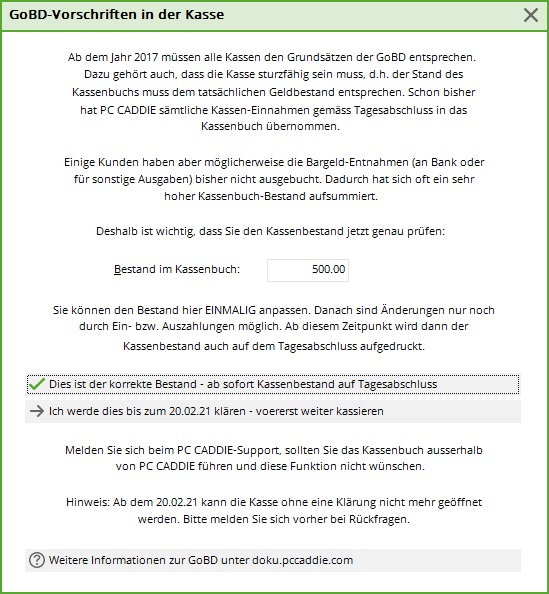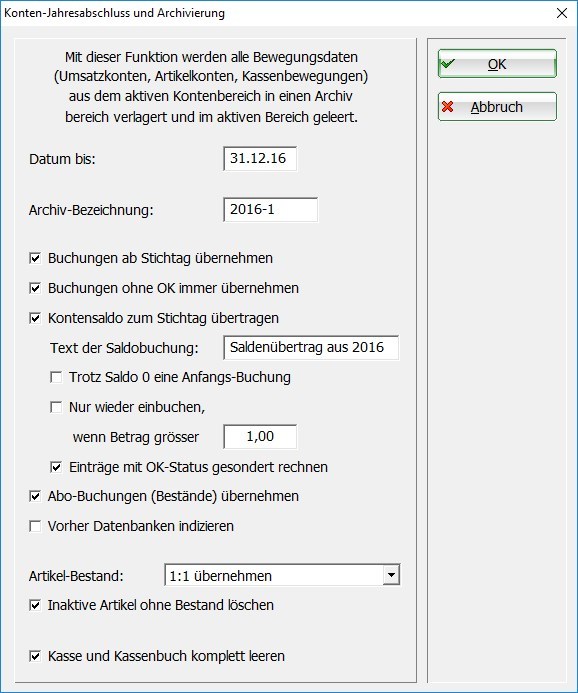Inhaltsverzeichnis
Cash register guidelines Germany and procedural documentation
Query the current cash balance
Due to the new requirements that the legislator has placed on cash registers in Germany since 1 January 2017, it is necessary to ensure correct inventory management in the cash register software. For this reason, we now actively query the current cash balance at the beginning of the year. For all customers who use our cashbook function, this stock should also match the actual value. Then all you have to do is confirm the value.
We generally recommend that our customers carry out a year-end closing in each cash account area at the turn of the year. Year-end closing via Turnover - Year-end closing - Archive old movements and only start again with the articles
If you have not yet entered any expenses or money transfers to the bank in PC CADDIE, the cash balance may of course be extremely high and require correction.
If you use an external cash book, we can of course also switch off the cash balance on the daily closing if you wish. Please contact us, we will be happy to advise you.
Cash guidelines
Requirements for cash register systems as of 01.01.2017
Since 1 January 2017, businesses that primarily conduct cash transactions are required to have an electronic cash register!
Only cash register systems that record individual sales at receipt level and can be stored for at least 10 years may be used.
All electronic cash register system data must be stored and must not be alterable. Deleting individual receipts in favour of the end-of-day total receipt is not permitted. Storing Z receipts on paper alone is also not sufficient.
Non-cash transactions, such as payments with EC cards or credit cards, must be recorded. It must be possible for the tax official to read the cash register data. For this purpose, the cash register data must be presented in a format that can be analysed.
The entrepreneur is obliged to have his cash register reprogrammed accordingly. If the cash register's memory is not sufficient to store all data permanently, the memory must be expanded. In the opinion of the tax authorities, it is reasonable to transfer the data to another unalterable data carrier.
All organisational documents relating to the cash register, such as the cash book, end-of-day totals receipts, Z receipts, financial reports, journal data, programme and master data change data, operating instructions, protocols for reprogramming, etc. must be stored for 10 years.
In principle, the data of old or no longer used cash registers must be stored in the same way as paper records within the 10-year period. The cash register data must be archived for this purpose. If the documents and data have been backed up, an old cash register can be disposed of.
Tips for correct cash register management
- Cash movements must be recorded daily.
- No posting without a receipt. If a receipt is missing, a personal receipt (e.g. tip) will help.
- Numbering: The receipts must be numbered consecutively each year starting with „1“.
- The actual balance in the cash register must match the debit balance in the cash book at all times. The balance according to the cash book must be checked by daily recounting!
- A negative cash balance is impossible - with correct cash management, the cash balance of the cash register can be at least 0.00 euros.
- Private deposits and withdrawals as well as transfers to and from the bank must be recorded daily.
- In the case of private advance payments and subsequent reimbursement from the cash register, the date of „expenditure“ and thus the date of entry in the cash register is always the date of payment from the cash register, not the receipt date.
- Daily accounts must be cancelled in full. This also applies to incorrect receipts. The daily accounts are numbered consecutively and no accounts may be missing. The operator statements cannot replace the daily statements as they are not numbered consecutively. The time of the daily closing should correspond to the actual closing time.
- Please note that the archive areas must not be deleted for 10 years.
Data access to cash register systems by the tax audit
All PC CADDIE data can be exported in a form suitable for GoDB. A detailed description of the export function can be found here: GoBD
GoBD (Principles for the proper keeping and storage of books, records and documents in electronic form and for data access)
Letter from the Federal Ministry of Finance on the GoDB from 2014
BMF letter dated 26 January 2015 - Amendments to the 2014 GoDB letter
To ensure that your business transactions are properly managed and stored, they must be complete and cannot be manipulated. The following points must be observed. All postings must
- Traceable
- Verifiable
- Complete
- Correct
- Unalterable
be.
Process documentation
1. organisation and data structure
Essential databases:
GOLFKONT.DBF All bookings - basically all figures can be found here.
GOLFMITG.DBF Member and customer data - possibly important for the restriction to customer groups.
GOLFBEIT.DBF Contributions and articles - possibly relevant for the analysis by article
The following databases could be supplemented if required, but the documents are all already contained in GOLFKONT.DBF:
PCC_KASS.DBF Cash register database of currently open cash transactions from daily closing to daily closing.
PCC_KAAR.DBF Archive database to which the cash transactions from PCC_KASS.DBF are copied at the end of the day.
2. posting procedure
During a checkout process, an article is immediately entered in the PCC_KASS.DBF with a data record.
The cash transactions are recorded chronologically and managed twice: On the one hand in the cash transactions database and on completion of the document posting in the overall journal. All transactions are assigned an ascending document number when they are posted. Item details, date, time, the operator ID and, if available, the till number are recorded for these transactions.
At the moment the receipt is printed, this step can no longer be cancelled undocumented. Each individual item can then only be cancelled out by an offsetting entry with a negative number. The date, time and operator ID are also recorded.
When the cash transaction is completed by a payment transaction (or posting to a clearing account (OP area)), all voucher postings are transferred to GOLFKONT.DBF and noted in the data entry log.
This means that there can be no item or invoice cancellation in the structure that is not ultimately traceable in GOLFKONT.DBF.
Data records are not deleted or reorganised at database level. In the databases, new business transactions are always appended at the end so that the chronology always remains traceable.
The software never deletes a data record in the GOLFKONT.DBF of the cash register. However, if vouchers are cancelled, the line items of the cancelled voucher are marked with a „D“ (=deleted) in the KONTTYP field. The line items are cleared again individually during the cancellation process, if necessary by an offsetting entry.
A detailed description of the cash register operation can be found here:
3. documentation / journals / receipts
3.1 Daily closing
The daily closing contains the following contents:
- Name of the company
- Date and time of preparation
- Consecutive daily closing number
- Total turnover
- Turnover by tax rate
- Breakdown of revenue by payment type
- Sales by operator
- Cancellations and discounts made
3.2 External document
The external document contains the following content:
- Name of the company
- Characteristic for cash register identification
- Date and time of document creation
- Receipt number
- Individual products and price
- Total amount
The amount paid in cash must be itemised according to tax rates.
We will be happy to assist you with the installation.
3.3 Outgoing voucher list with the consecutive numbers and amounts of the sales vouchers (outgoing invoice list)
Creating the outgoing voucher list
3.4 Sales statistics for analysing postings by article and product group, each of which can be combined with the document numbers
3.5 Evaluations of price changes and cancellations
Creating the list of price changes
4. data backup / data export
All transactions are stored in databases on data carriers in the cash register or on the customer's server. The customer is always responsible for backing up this data. We recommend backing up data by storing it unalterably on an external data carrier. The backed-up data must provide the same analyses as the current POS system.
- Keine Schlagworte vergeben



